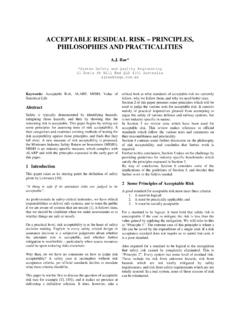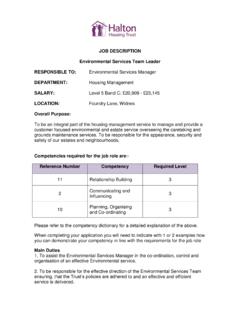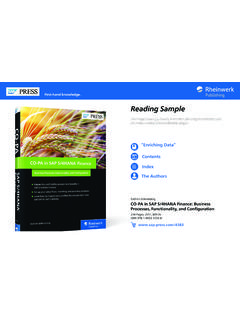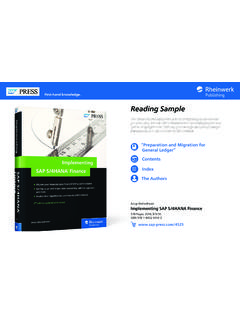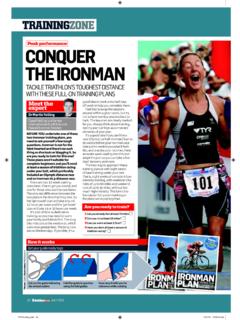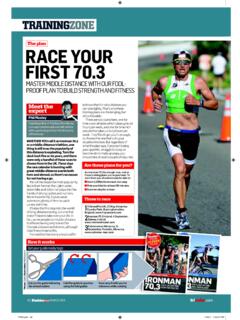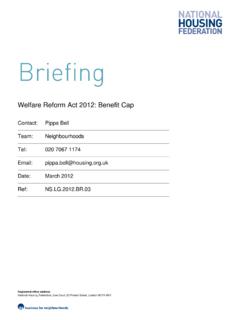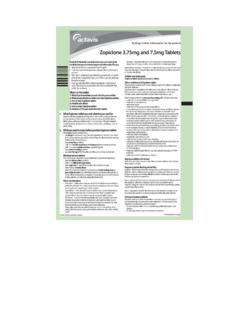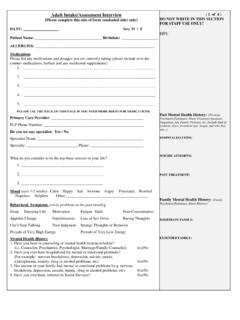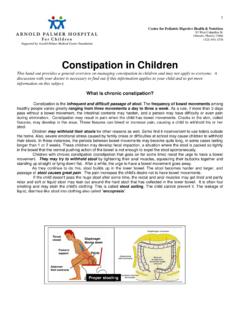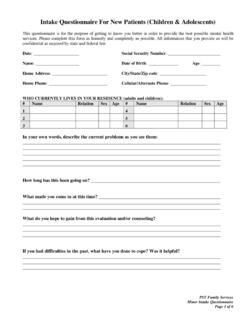Transcription of CLAIMING PERSONAL INDEPENDENCE PAYMENT
1 A GUIDE FOR ADULTS WITH CROHN S DISEASE ORULCERATIVE COLITIS CLAIMING PERSONAL INDEPENDENCE PAYMENT12 ABOUT THIS GUIDEThis guide is for people aged 16 to 64 with Inflammatory Bowel Disease - Ulcerative Colitis or Crohn s Disease - who are thinking about applying for PERSONAL INDEPENDENCE PAYMENT (PIP). The guide explains what PIP is, who can qualify and how to apply. It includes information on how to increase your chance of a successful may find this information helpful even if you do not think you will qualify for PIP. People sometimes miss out on benefits for years because they don t realise they are entitled to claim or don t think their claim will be successful. If you aren t sure whether you qualify for PIP, you could contact one of the organisations listed on page guide does not include information on benefits for people younger than 16, or older than 64. If you would like to claim for someone younger, you may like to read our guide CLAIMING Disability Living Allowance: A guide for children under 16 with Ulcerative Colitis and Crohn s Disease.
2 If you are 65 or over, you can apply for Attendance Allowance. You can find out more from the organisations listed at the end of this guide. ABOUT CROHN S AND COLITIS UK We are Crohn s & Colitis UK, a national charity fighting for improved lives today and a world free from Crohn s and Colitis tomorrow. To improve diagnosis and treatment, and to fund research into a cure; to raise awareness and to give people hope, comfort and confidence to live freer, fuller lives. We re here for everyone affected by Crohn s and publication is available for free thanks to the generosity of our supporters and members. Find out how you can join the fight against Crohn s and Colitis: call 01727 734465 or visit Crohn s & Colitis UK 2018 and 2019 CLAIMING PERSONAL INDEPENDENCE PAYMENT - Edition 3a Amended 2021 Last review: April 2018 Contact details updated: March 2019 Next planned review: 2021 What is PERSONAL INDEPENDENCE PAYMENT (PIP)? 3 How much could I get? 3 Who provides PIP 4 What happens if I am CLAIMING Disability Living Allowance?
3 4 Could I qualify for PIP? 4 Age 4 Residency and presence 4 Impact of your IBD 5 Terminal illness 6 How do I apply for PIP 71. Registering your claim 7 Before you call 7 What happens next? 82. Completing the form 8 How your disability affects you Getting help with the form 8 Completing the form: Questions 1 and 2 9 Competing the form: Questions 3 to 15 10 Daily living activities and descriptors 12 Mobility activities and descriptors 21 Before you send off the form 25 What happens after I return the form? 273. The face-to-face consultation 28 Getting ready for the consultation 28 Travelling to the consultation 28 What happens at the face-to-face consultation? 29 Will I have a physical examination? 30 Recording and taking notes 304. Receiving a written decision 30 The decision 31 How long will I get PIP for? 31 What happens if I go into hospital? 32 What happens if I go abroad? 32 What happens if I am not happy with the 32 outcome of my claim?
4 Mandatory reconsideration 32 Tribunal appeal 33 How will PIP affect my other benefits? 34 Quick guide to applying for PIP 35 How we can help you 37 Other useful organisations 38 Appendix 1: Sample diary 39 Appendix 2: Health professionals sheet 40 Appendix 3: Words used in the activities 43 and descriptors CONTENTSPLEASE NOTE: PIP is subject to change. This guide is not a full and authoritative statement of the law. The information in this guide is intended as general information only and is not intended to be relied upon by any individual in relation to their specific circumstances. It is not intended as a replacement for appropriate professional advice. 34 WHAT IS PERSONAL INDEPENDENCE PAYMENT ? PIP is a welfare benefit for adults with a disability or long-term condition, such as Inflammatory Bowel Disease (IBD). PIP helps to cover the extra costs you may face if your IBD makes it hard for you to get around or cope with daily living. PIP has two parts, called the daily living component and the mobility component.
5 You may qualify for one or both. Your claim will be assessed using a points system. You can score points if you have difficulty carrying out certain activities, such as using the toilet or walking. You cannot score points just for having IBD - you need to show how your IBD affects your life. Whether you qualify for PIP, and how much you get, depends on the total number of points you score for all of the listed activities. You can read more about the points system on page 10. How much could I get? Whether you qualify for the daily living component, the mobility component or both depends on how your IBD affects you. Each component has two rates a standard rate and an enhanced rate. The rate you get depends on how badly your IBD impacts your daily life. Your rate will be reviewed regularly to make sure you are receiving the right amount of of April 2018, the weekly rate for the daily living component of PIP is: Standard rate - Enhanced rated - weekly rate for the mobility component is: Standard rate - Enhance rated - These rates may be subject to change.
6 You can find the current weekly rates for PIP on the DWP and DfC websites. PIP is usually paid every four weeks into your bank, building society or credit union account. It is tax-free and you can get it whether or not you are working. You can claim PIP even if you have a high income or a high level of savings. It is paid on top of any other benefits you may be receiving, and it may mean you qualify for a top-up on some of your other benefits. You can read more about other benefits on page 34. Who provides PIP?The Department for Work and Pensions (DWP) is responsible for PIP in England, Wales and Scotland. Scotland is introducing a new Social Security System, which includes PIP, so there may be some changes to PIP in the Northern Ireland, the Department for Communities (DfC) is responsible for can find contact details for the DWP and DfC at the end of this guide. What happens if I am CLAIMING Disability Living Allowance?PIP is replacing Disability Living Allowance (DLA) for everyone aged 16 to 64.
7 The DWP or DfC intends to write to you by mid-2019 to invite you to make a PIP claim. They will ask you to transfer from DLA to PIP if you were born after 8 April 1948 (20 June 1951 in Northern Ireland) and you are aged 16 or over. If you were born before this date, you will be able to carry on receiving you do not respond to the DWP or DfC when they invite you to claim PIP, your existing award of DLA will stop. PIP and DLA have different qualifying conditions. This means that some people who currently get DLA will not qualify for PIP, and some who did not qualify for DLA may be able to get PIP. If you currently get DLA, you may get more money, the same amount or less money when you apply for cannot receive PIP and DLA at the same time. COULD I QUALIFY FOR PIP? To qualify for PIP, you will need to meet the conditions listed below. Many people tell us that they have struggled to get PIP or that their claims have not been successful. There is information on page 32 about what to do if your claim is turned down.
8 Age You must be aged between 16 and 64 at the start of your claim. If you receive PIP before your 65th birthday, you can continue to receive it after you turn 65. Children under the age of 16 may be able to apply for Disability Living Allowance. If you are aged 65 or over and you do not already get PIP or DLA, you may qualify for Attendance Allowance. Residency and presence You must: be living in England, Wales, Scotland or Northern Ireland when you apply for PIP and have lived in one of these countries for at least two of the last three years. There are some exceptions to these rules, for example, if you are an Armed Forces member or family member. If you get DLA, even if you have been awarded indefinite or lifetime DLA, you will need to transfer to PIP. TIP56 If you have not spent two out of the last three years in the UK, it may be possible for time spent in another EU or EEA country, or Switzerland, to be taken into account. If you are not a British citizen, you may be able to apply for PIP if you usually live in, or plan to settle in, the United Kingdom, the Republic of Ireland, the Isle of Man or the Channel Islands.
9 You must not be subject to immigration control, unless you are a sponsored immigrant. If you are not sure how your immigration status affects you or if you have recently spent a long time abroad, you may want to get advice from one of the organisations listed at the end of this guide. IMPACT OF YOUR IBD You will need to show that your IBD affects your daily life. To claim PIP, you must: have had problems with daily living activities and/or mobility difficulties for at least three months and expect these problems to last for at least another nine months. You can apply for PIP sooner than this, but you will not receive any PAYMENT until after the three-month qualifying period. You may qualify for the daily living component if you have difficulty with any of the following activities. 1. Preparing food 2. eating and drinking 3. Managing treatments 4. Washing and bathing 5. Managing toilet needs 6. Dressing and undressing 7. Communicating 8. Reading 9. Mixing with other people 10.
10 Making decisions about money Here are some questions to help you decide whether you are likely to qualify for the daily living component (continues on next page). Think about the times when you do each of the activities listed above and ask yourself: Does it take me a long time? Am I in pain or discomfort? Is it difficult for me to do? Do I need prompting or help from another person? Do I need any aids or appliances to help me? Have I had any accidents, such as falls, while doing this activity?TIP You may qualify for the mobility component if you have difficulty with any of the following activities: Planning and following journeys Moving around To help you decide whether you qualify for the mobility component, think about the activities listed above and ask yourself: Do I walk slowly or find it difficult to walk? Am I in pain or discomfort? Could it make my IBD worse? Do I need prompting or help from another person? Do I need a walking aid, such as a walking stick?
